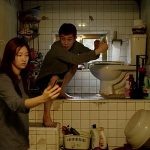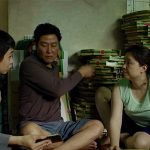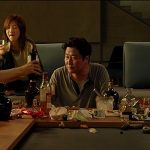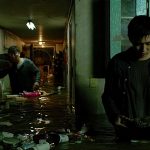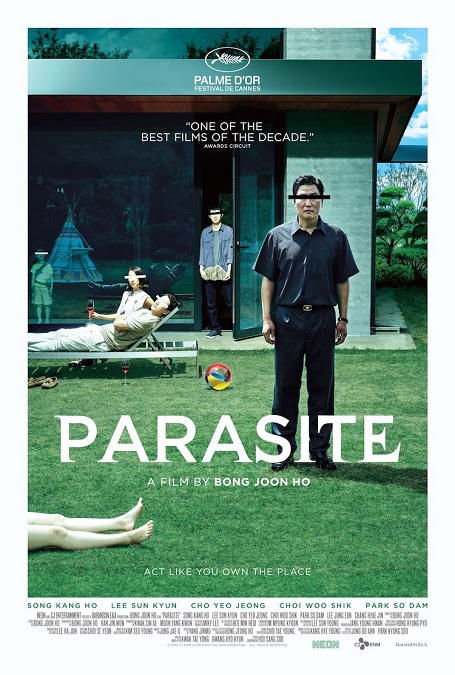



Parasite – 2019
What a historic Best Picture winner! This was a movie that came out of South Korea, a foreign language film that had English subtitles. Many people felt chagrinned that this movie took home the top prize and I’ll have to admit, that I was similarly prejudiced against a film that I had to read as I watched. That is, until I finally watched it. Then my opinion completely changed, and I understood why it won the coveted award. It was just a really good movie, no matter what language the dialogue was in.
You see, I had always been of the opinion that the Academy Awards was basically an American institution, but one that didn’t ignore foreign films. After all, they had their own category and received their own awards. I never gave non-English-speaking films much consideration. This closed-minded outlook was only reinforced last year when the movie Roma got so much attention. I watched that film, and honestly, was completely unimpressed. I found it to be a well-crafted movie that was ultimately boring to watch.
But Parasite was such a good movie. It was an original story with characters that were well-written, a relevant social message, gripping drama, and excellent acting. The director, Bong Joon-ho, was also the man who penned the script. The plot was engaging, easily keeping my interest for the entire duration. The ending was surprising and thought provoking, and perfectly plausible. It was a smart movie that wisely took the time to develop characters that were real and easy to identify with, despite being foreign to me, an unknowledgeable American.
I’ll start off with a quick plot synopsis and character descriptions before moving on to the deeper meanings and metaphorical aspects of the movie. The film starts out following the poor Kim family living in a slum. They live in a filthy basement that is infested with cockroaches. But the family has three things going for it. The children are smart, the parents are skilled laborers, and none of them have any scruples. They are all con artists. To be fair, they would work, except that there are no jobs available.
The son, Ki-woo, played by Choi Woo-shik, takes advantage of an opportunity to tutor Da-Hye, played by Jung Heyon-jun, the teenage daughter of a very wealthy family living in the fantastic house belonging to the Park family. Mrs. Park, played by Cho Yeo-jeong is not terribly smart, and is easily taken in when Ki-woo suggests an art teacher for her young son, Da-song, played by Jung Hyon-jun, who has emotional problems after believing he has seen a ghost. In comes Ki-jung, Ki-woo’s sister, to be the art tutor. After that, they cleverly, yet viciously, manipulate the two members of the Park household staff to be fired so that Mr. Kim, played by Song Kang-ho, can become the driver for Mr. Park, played by Lee Sun-kyun, and Mrs. Kim, played by Jang Hye-jin, can become the housekeeper. Thus, the entire Kim family becomes employed by the Park family, and live their days in luxury.
When the Parks leave on a camping trip, the Kims have the run of the house, eating the food, drinking the liquor, and making a great mess of the place. But then things go horribly awry when the displaced housekeeper, Moon-guang, played by Lee Jung-eun, shows up at the door. She asks to come in so that she can reveal a hidden passageway in the cellar. The secret passage leads to a dark and run-down bunker where her husband, Geun-sae, played by Park Myung-hoon has been living for years, hiding from loan-sharks. A fight breaks out for control of the house, a fight which is broken up by the arrival of the Park family, whose camping trip has been ruined by a massive monsoon downpour.
But then the movie switched gears from being about a family of con artists, to something akin to a suspense thriller. Some people are injured, others are killed, and everyone’s lives are pretty much destroyed. There are several “Oh my God!” moments that had me on the edge of my seat. Bong Joon-ho really knew what he was doing to keep the action and the drama going at a good pace, not too fast and not too slow.
The only real problem I had with this whole scene is that when they thought they had the house for the weekend, the Kim family made a huge mess. Food crumbs, broken dishes, trash, and spilled alcohol littered the living room that was usually kept in a pristine state. When the Parks phone to tell Mrs. Kim, who is now the housekeeper, that they would be home in minutes, they somehow are able to clean everything by sweeping it all under the giant coffee table, then hiding under the table themselves. Apparently, Mr. and Mrs. Parks could not smell the spilled alcohol or see a single crumb on the floor. There were no scuff marks on the hardwood floor after the violent scuffle that had taken place on it only a short time before. It was a great scene, but not entirely believable. But if that’s my biggest complaint, then the movie is doing just fine.
I thought that the standout members of the cast were Song Kang-ho playing the father of the Kim family. There was a great scene in which he revealed the character’s philosophy of life, that the only plan that never fails is to never have a plan, and Kang-ho really sold the idea. Also, I liked Lee Sun-kyun, playing Mr. Park. I’m not exactly sure why he stood out to me, but something about him seemed to be a small cut above his fellow actors.
Interesting note: Parasite was nominated for six Academy Awards, winning four of them. I am not surprised that the director, Bong Joon-ho, took home the Oscars for Best Director and Best Original Screenplay, along with Han Jin-won. I would have liked to see a Best Actor nomination for Song Kang-ho, but I suppose it would have been difficult to single out a lead actor from the ensemble cast.
But the movie was more than a simple drama/con job/suspense film. It was also a social commentary about the different classes in the Korean society. The Kims lived in poverty in a basement while the Park family lived in luxury on top of a hill. But the point was made that even when the poor people usurped the possessions of the wealthy family, the still behaved like poor slobs and crude, low-class con artists. On the surface, the film’s title is an obvious one, where the Kim family is a parasite to the Park family, dishonestly living off of their good fortune. But Bong Joon-ho has said that the Parks were parasites as well, feeding off the poor people that served them. The point was made that the Parks were unable to take care of themselves, that without their hired help, their household would fall into chaos and ruin. They didn’t even know how to wash their dishes.
I liked the setting of the Park’s house because it was beautiful and spacious, but it was only made that impressive because we saw the other side. The filthy squalor of the Kim family’s residence was absolutely pathetic, a fact that was emphasized by the flood that destroyed all their scant possessions. The Kims were wading through raw sewage that came up to their waists while the Parks were remaining clean, dry, and comfortable on the top of a hill. So the film was really pointing out the extreme differences between those who had, and those who had not.
The shocking ending of the movie was also a very thought provoking one. The Kim family accidentally murders Moon-guang and traps her husband in the tiny bunker with her body. But at Da-song’s birthday party, he escapes, critically wounds Ki-woo, and murders Ki-jung with a kitchen knife in front of the party guests, after which Mrs. Kim kills him. Da-song goes into a trauma-induced seizure. Mr. Kim, incensed that Mr. Park is more concerned about his son’s seizure, and the bad smell of the murderer, than Ki-jung’s death, takes the knife and stabs Mr. Park in the heart. He runs as police sirens begin to sound.
The film ends with Mr. Kim hiding in the bunker with no hope of escape, sneaking out at night to steal food from the refrigerator of the next owners of the house. Ki-woo, recovered from his injuries, learns of his father’s whereabouts and has dreams of making enough money to purchase the house, himself in order to rescue his father, even though he would still have to remain in the house to avoid punishment for his crime. But it is a moot point. Ki-woo will never have that kind of money, and he will never be able to rescue his father.
After watching the film, I found myself wondering if the ending was plausible, and I think it is. And I also found myself wanting to know what happened to the Kim family next. Would Ki-woo ever be able to get into the house to get his father out? But I’m glad they never answered that question. Leaving it a mystery was a smart choice.
Interesting note: In doing my research, I have learned that the film made $257 million worldwide on a budget of $11 million. According to Wikipedia, “A South Korean local government plans to restore the Goyang Aqua Special Shooting Studio set, where the film Parasite was produced, and use it as a Parasite movie experience tourism facility. In addition, Goyang City has announced that it will invest $150 million in the development of the Goyang Film Culture Complex by 2026 to accommodate film experience tourism facilities, additional indoor studios, outdoor set production facilities, inter-Korean video content centers, and image research and development companies. However, criticisms have been raised about the commercialization of areas known for poverty in South Korea and tourist destinations without concrete steps being taken to address the issues at hand.” I couldn’t agree more on that point.
I know that a lot of people were not happy that a non-English speaking foreign film took home the Oscar for Best Picture. Before watching the movie, I was one of them. But this was just a really good movie. It was well-crafted, excellently directed, clever, topical, and just an incredibly engaging movie to watch. It was a film that I believe deserved its win. From now on I’ll have to keep a more open mind about foreign films.
